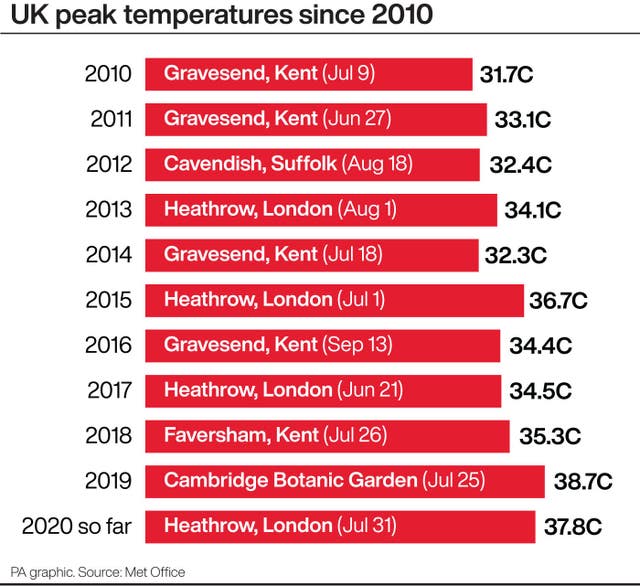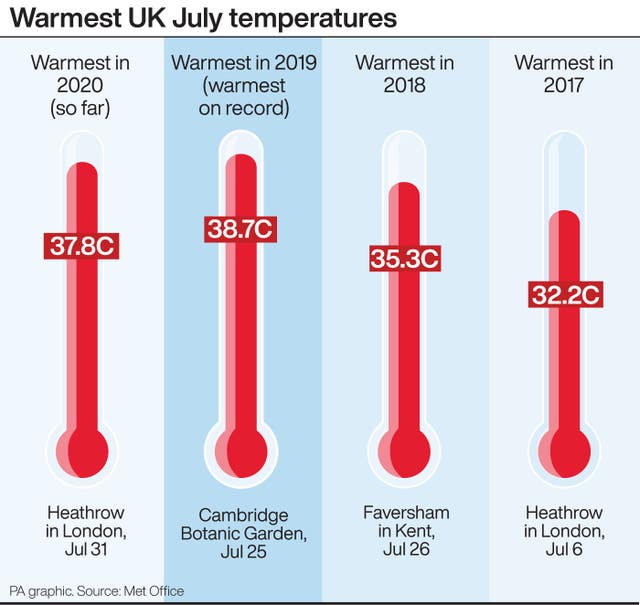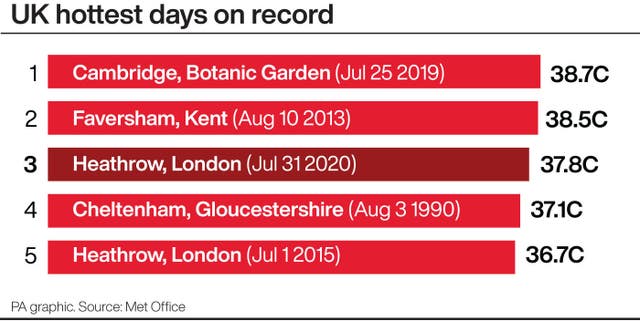Storm warning as temperatures soar on UK’s third hottest day on record
Forecaster Simon Partridge said: “This not only makes it the warmest day of the year, it also makes it the third hottest UK day on record.”

A storm warning covering much of England has been issued as temperatures soared to make Friday the third hottest UK day on record.
The mercury hit 37.8C (100F) at London’s Heathrow Airport at 2.41pm and also reached 37.3C (99.1F) at Kew Gardens, in west London, the Met Office said.
Forecaster Simon Partridge said: “This not only makes it the warmest day of the year, it also makes it the third hottest UK day on record.”
It comes on the day the Met Office warned climate change was exerting an “increasing impact” on the UK and data showed an “undeniable warming trend”.
The current temperature record was registered at 38.7C (101.7F) at Cambridge University Botanic Gardens last year, while the second hottest day was 10 August 2003, when the mercury rose to 38.5C (101.3F) in Faversham, Kent.
There will be a marked turn in the weather in large parts of England later on Friday, with the Met Office adding: “But it’s not blue skies everywhere. This afternoon will see cloud increasing in the west and the risk of thunderstorms in the east.”
A yellow weather warning has been issued from 4pm until midnight across large parts of east and south-east England where the weather will be at its hottest.

This includes chances of gusty winds, hail and “frequent lightning strikes” which could cause damage to buildings.
The warning stretches from East Yorkshire, down the east coast and covers East Anglia, London and the eastern half of Kent.
The Met Office said, although a large amount of rain is unlikely, some places may experience heavy downpours and receive as much as 15-20mm of rain in less than an hour.
The storms will be caused by hot air moving in from mainland Europe, some parts of which will be cooler than the UK.
So far this month, the highest maximum temperature recorded was 28.5C (83.3F) on July 17, also at Heathrow Airport.
The UK has already surpassed 100% of the average monthly rainfall and only experienced two thirds (66%) of the expected sunshine for an average July, a total of 113.4 hours, Met Office figures show.
Popular tourist spots on the continent including Ibiza, Lisbon and Berlin were set to fall short of the UK high, reaching 33C (91.4F), 30C (86F) and 25C (77F) respectively.

Cooler air is on the way for anyone not enjoying Friday’s hot spell as a colder front will sweep across the UK in the next 24 hours.
The Met Office said temperatures will be back closer to average on Saturday but it will still be pretty warm in the South East.
Mr Partridge said “the weekend is going to be pretty good” and added: “Both days are going to be mostly dry across the UK with sunny spells and some showers at times that may be out to the north and the west of the country.”
Temperatures in the South East on Saturday could reach 26C or 27C and it could feel a little bit fresher with highs of 23C or 24C on Sunday.
Earlier, Brighton & Hove City Council tweeted that it was “concerned about the number of people in the city” and stated that “large numbers make it impossible to maintain physical distancing”.

It said there was limited capacity on public transport and urged anyone who was not already there to avoid travelling to the city on Friday.
Dorset Council said car parks in West Lulworth were full and urged visitors to head somewhere quieter.
In Kent, Thanet District Council said some of its most popular beaches were full.
Southern Rail also noted that its services were “busier than usual today due to the hot weather as people travel to and from their favourite destinations”.
It urged people not to board a train if there was not space for them to travel safely.
The RNLI and coastguard also told people not to take inflatables to the beach and urged them to be aware of the tide times, local hazards and potentially deadly rip currents.
It comes as seven people were rescued after being caught in a strong, fast-moving current in Wales on July 26, according to the RNLI whose lifeguards dealt with more than 1,500 incidents involving rip currents last year.





